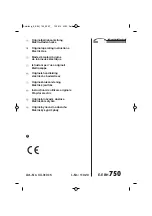
M02
J40
M6-
04
WDAT-3
2.160-3.660
- D E C O M M I S S I O N I N G O F T H E U N I T -
59
- D E C O M M I S S I O N I N G O F T H E U N I T -
DISCONNECTING THE UNIT
The units must be disconnected by authorised personnel, who before proceeding must first read the Residual Risks
section in this manual.
Before disconnecting the unit, the following must be recovered, if present:
•
the refrigerant (if the circuits cannot be isolated): the refrigerant must be removed using suction devices
operating in a closed circuit, so as to ensure that none of the compound is released into the atmosphere.
•
the antifreeze in the circuits: when removing this fluid, make sure that it does not leak and that it is not released
into the environment. The antifreeze fluid must be stored in special containers.
When recovering the substances present in the unit, all measures must be taken to avoid damaging persons and things
and polluting the surrounding area.
Awaiting dismantling and disposal, the unit can also be stored outdoors, as bad weather and rapid changes in
temperature will not cause damage to the environment, if electric, cooling and hydraulic circuits of the unit are integral
and closed.
DISMANTLING AND DISPOSAL
THE UNIT MUST ALWAYS BE SENT TO AUTHORISED CENTRES FOR DISMANTLING AND DISPOSAL.
When dismantling the unit, the fan, the motor and the coil, if operating, may be recovered by the specialist centres for
reuse.
All the materials must be recovered or disposed of in compliance with the corresponding national standards in force.
For further information on the decommissioning of the unit, contact the manufacturer.
Summary of Contents for WDAT-3 2.160
Page 2: ......


































